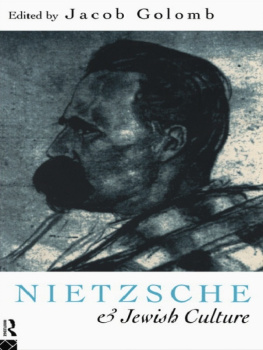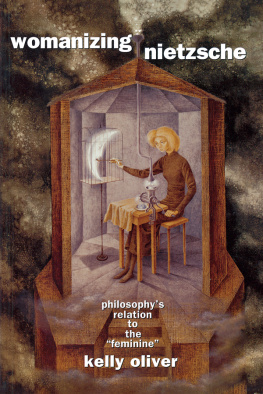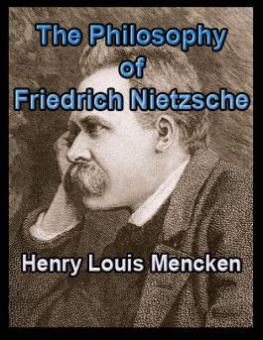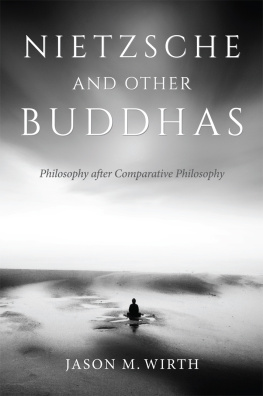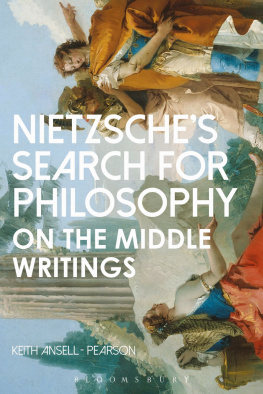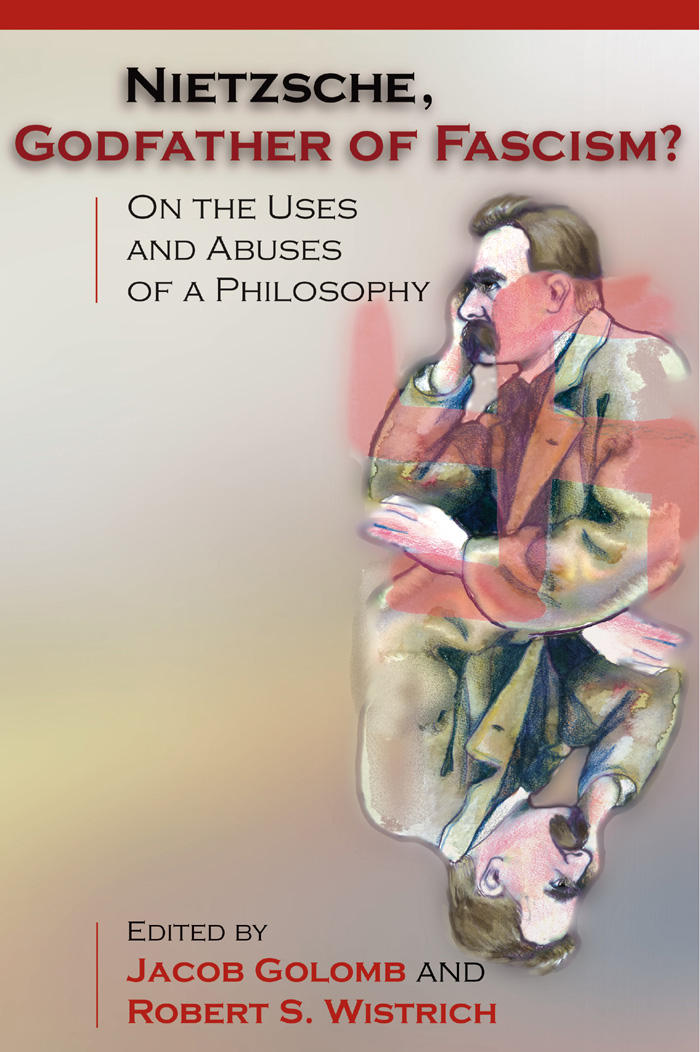NIETZSCHE, GODFATHER OF FASCISM?
NIETZSCHE, GODFATHER OF FASCISM?
ON THE USES AND ABUSES OF A PHILOSOPHY
EDITED BY
JACOB GOLOMB AND ROBERT S. WISTRICH
PRINCETON UNIVERSITY PRESS
PRINCETON AND OXFORD
Copyright 2002 by Princeton University Press
Published by
Princeton University Press,
41 William Street,
Princeton, New Jersey 08540
In the United Kingdom:
Princeton University Press,
3 Market Place,
Woodstock, Oxfordshire OX20 1SY
All Rights Reserved
Library of Congress Cataloging-in-Publication Data
Nietzsche, godfather of fascism? : on the uses and abuses of a philosophy / edited by Jacob Golomb and Robert S. Wistrich.
p. cm.
Includes bibliographical references and index.
eISBN: 978-1-40082-533-2
1. Nietzsche, Friedrich Wilhelm, 18441900. 2. National socialism and philosophy. 3. Fascism. I. Golomb, Jacob. II. Wistrich, Robert S.,
1945
B3317 .N4939 2002
193dc212001055185
British Library Cataloging-in-Publication Data is available
This book has been composed in Sabon.
Printed on acid-free paper.
www.puppress.princeton.edu
Printed in the United States of America
10 9 8 7 6 5 4 3 2 1
Power makes stupid.... Deutschland, Deutschland ber alles I fear that was the end of German philosophy.
Nietzsche, Twilight of the Idols
You say it is the good cause that hallows even war? I say unto you: it is the good war that hallows any cause. War and courage have accomplished more great things than love of the neighbor.
Thus Spoke Zarathustra
The secret for harvesting from existence the greatest fruitfulness and the greatest enjoyment is to live dangerously!
The Gay Science
Vivi pericolosamente!
Benito Mussolini, August 1924
CONTENTS
Jacob Golomb and Robert S. Wistrich
Jacob Golomb
Berel Lang
Wolfgang Mller-Lauter
Alexander Nehamas
Menahem Brinker
Yirmiyahu Yovel
Robert S. Wistrich
Daniel W. Conway
Stanley Corngold and Geoffrey Waite
Robert C. Holub
Mario Sznajder
David Ohana
Kurt Rudolf Fischer
Roderick Stackelberg
ACKNOWLEDGMENTS
The editors warmly thank Brigitta van Rheinberg for her invaluable encouragement, help, and advice over and above the call of duty, in seeing this project through from its beginnings. We are especially grateful to all the contributors for their cooperation and willingness to accept the many queries, requests, and occasional nagging demands of the editors. The observations and helpful suggestions of the two anonymous readers also proved useful.
Finally, we would like acknowledge the professionalism and acumen of the staff at Princeton University Press, especially Linda Truilo, who saw this volume through to its happy conclusion.
A NOTE ON SOURCES AND LIST OF ABBREVIATIONS
For the convenience of readers, most of the contributors have, wherever possible, followed the most accessible English-language translations and editions of Nietzsches major worksthose by Walter Kaufmann and R. J. Hollingdale (for details see the section Works of Nietzsche Cited at the end of this volume). All quotations from Nietzsches writings are given within the text and identified by the use of the acronyms of their English titles, followed by Arabic numbers referring to the paragraphs or sections in which the passages appear. Where appropriate, Roman numerals are used to indicate the parts of the works in which they are to be found. Citations from his other works and letters are based on the texts as they appear in the Colli-Montinari Kritische Gesamtausgabe (KGA), or Kritische Studienausgabe (KSA), and Smtliche Briefe: Kritische Studienausgabe (KGB) unless otherwise noted.
A | The Antichrist |
BGE | Beyond Good and Evil |
BT | The Birth of Tragedy |
CW | The Case of Wagner |
D | Daybreak |
EH | Ecce Homo |
GM | On the Genealogy of Morals |
GS | The Gay Science |
HH | Human, All Too Human |
NCW | Nietzsche contra Wagner |
TI | Twilight of the Idols |
UM | Untimely Meditations |
WP | The Will to Power |
Z | Thus Spoke Zarathustra |
CONTRIBUTORS
MENAHEM BRINKER is Professor of Hebrew Literature and Philosophy at the Hebrew University of Jerusalem and Henry B. Crown Professor of Modern Hebrew Studies at the University of Chicago. He is the author of five books in Hebrew on philosophy and literary theory, aesthetics, and modern Hebrew literature. His forthcoming book is Last Jews or Modern Hebrews (Yale UP).
DANIEL W. CONWAY is Professor of Philosophy and Director of Graduate Studies in Philosophy at The Pennsylvania State University. He has published widely on topics in political philosophy, contemporary European philosophy, and nineteenth-century philosophy. He is the author of Nietzsche and the Political (Routledge, 1997) and Nietzsches Dangerous Game (Cambridge UP, 1997).
STANLEY CORNGOLD is Professor of German and Comparative Literature at Princeton University. He has written Complex Pleasure: Forms of Feeling in German Literature (Stanford UP, 1998), The Fate of the Self: German Writers and French Theory (Columbia UP, 1986; Duke UP, 1994), Borrowed Lives (SUNY Press, 1991), and Franz Kafka: The Necessity of Form (Cornell UP, 1988).
KURT RUDOLF FISCHER is Honorary Professor in the Institute fr Philosophie, University of Vienna. He is the author of Nietzsche und das 20. Jahrhundert, Philosophie aus Wien, and Aufstze zur Anglo-Amerikanischen und sterreichischen Philosophie, and the editor of sterreichische Philosophie von Brentano bis Wittgenstein.
JACOB GOLOMB teaches philosophy at the Hebrew University of Jerusalem and serves as the director of its Center for Austrian Studies. His books include Nietzsches Enticing Psychology of Power (Hebrew University Magnes Press, 1989), Introduction to Philosophies of Existence (Ministry of Defence Press, 1990), and In Search of Authenticity (Routledge, 1995). Among his edited works is Nietzsche and Jewish Culture (Routledge, 1997). He is coeditor of Nietzsche and Depth Psychology (SUNY Press, 1999). His forthcoming book is Nietzsche in Zion (Cornell UP).
ROBERT C. HOLUB teaches German intellectual, cultural, and literary history in the German Department of the University of California, Berkeley. Among his numerous publications are



![Nietzsche - Twilight of the Idols [N.F. - Philosophy]](/uploads/posts/book/249935/thumbs/nietzsche-twilight-of-the-idols-n-f.jpg)


